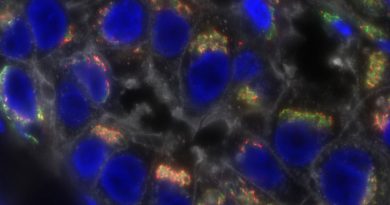Restoring Glutathione Levels Promotes Metabolic Health in Older HIV-Infected Patients
Restoring levels of glutathione, the body’s most abundant antioxidant, in older patients with HIV (the human immunodeficiency virus that causes AIDS) improved cellular ability to burn fuel, sensitivity to insulin, body composition and muscle strength, said researchers from Baylor College of Medicine in a recent publication in the Journal of Clinical Endocrinology & Metabolism.
“This new finding highlights the importance of glutathione in accelerated aging in HIV patients,” said Dr. Rajagopal V. Sekhar , associate professor of medicine at Baylor College of Medicine and corresponding author of the study.

Associate Professor of Medicine
Elevated oxidative stress has been strongly linked with aging and aging-related illnesses. Human cells resist such damage through production of antioxidants that neutralize damaging reactive oxygen species. Glutathione is the most abundant antioxidant in our cells, playing a central role in antioxidant defenses, and is synthesized from three amino acids – glutamate, cysteine, and glycine.
Older people
In a previous study, Sekhar found that older people were not able to make glutathione as well as younger people because they had very low levels of two building block amino-acids, cysteine and glycine. Supplementing their diets orally with cysteine and glycine in the right form and formula effectively corrected these deficiencies. These results already have been published in the American Journal of Clinical Nutrition. In additional studies, Sekhar’s group found that deficient mitochondrial fat metabolism was linked to glutathione deficiency, and that correcting glutathione deficiency also improved mitochondrial fuel burning function in aging, as published in the Aging Cell.
Sekhar’s group currently is conducting studies to understand the metabolic benefits of restoring Glutathione in elderly/senior people. The interesting point about Sekhar’s approach is that his group supplements precursor amino-acid proteins cysteine and glycine, and not glutathione itself.
“Simply supplying glutathione in the diet may not be effective, because it will be degraded into its component amino-acids, glutamate, cysteine and glycine,” said Sekhar. “Providing cysteine in the form of N-acetylcysteine improves absorption and cysteine bioavailability for use in cells.”
Accelerated aging
People infected with HIV have accelerated aging. Sekhar investigated whether accelerated aging and decreased muscle strength in older HIV-infected patients could also be linked to mitochondrial defects caused by glutathione deficiency. His team conducted a pilot study where a small group of older HIV patients were studied before and after 14 days of oral supplementation with N-acetylcysteine and glycine. They found that: (1) older HIV people had diminished glutathione synthesis because of cysteine and glycine deficiency in cells, but this deficiency could be rapidly corrected by supplementing N-acetylcysteine and glycine in the diet; and (2) improving glutathione levels led to striking improvement of mitochondrial ability to oxidize fat and carbohydrates. They also saw improvements in insulin sensitivity, body composition and muscle strength.
“The results of our current HIV study together with our previously published aging studies suggests that glutathione deficiency could play an important role not only in normal aging but could also be contributing to accelerated pathological aging, like HIV infection,” said Sekhar. “More importantly, this devastating glutathione deficiency can be quickly reversed by oral supplementation of its precursor amino acids which these patients are deficient in.”
Sekhar’s technology was granted an issued U.S. Patent in 2013 and there are other patents pending. PharmaPlan LLC entered into an exclusive license agreement with Baylor College of Medicine to develop a product based on Sekhar’s research discoveries. Vitavis Laboratories, a subsidiary of PharmaPlan, just announced their new dietary supplement, Pruvin™, which is enabled by these discoveries.
The technology commercialization and patent application is led by Baylor Licensing Group, the technology transfer office at Baylor College of Medicine, with the mission to maximize the impact of research at Baylor College of Medicine through commercial relationships that lead to agreements to support the development of new products and services that benefit patients and the public.




I truly like your style of blogging. I tag it to my favorites internet site list and will be checking back soon. Please check out my web site also and let me know what you think.
Nice read, I just passed this onto a friend who was doing some research on that.
And he actually bought me lunch since I found it
for him smile Thus let me rephrase that: Thank you for
lunch!
good information for me